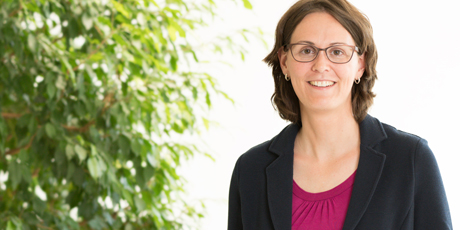Navigation auf uzh.ch
Navigation auf uzh.ch
Theoretical chemist Sandra Luber is as versatile as the problems she tackles with her innovative way of computer modelling.

Website Prof. Dr. Sandra Luber
When did you know that you wanted to become a chemist?
SL: This happened relatively late, say after my first year as a student in the science of public administration.
There is quite a difference between the science of public administration and chemistry. How did this happen?
SL: When graduating from high school I had excellent grades, but not a clue regarding what I wanted to study. I took a job in a government department. My colleagues and family advised me to study public administration because of the possibilities it offered regarding family and kids. So I started, but quickly realized that I was completely bored by the topic. I thought back to my favorite subjects during the gymnasium. These had been chemistry and physics. I decided to go for chemistry because I felt a bit uneasy about physics.
With a high school diploma in fine arts, what was the greatest challenge you met during studying chemistry?
SL: Clearly, as a student with a fine arts background I have had less schooling in natural sciences compared to students from other types of high schools. For instance: I had never held a test tube in my hands before. Also, I was always frustrated when an experiment did not work and nobody was capable of explaining the exact reasons. This experience triggered my interest for theoretical chemistry and the development of new methods and already as a student I turned towards these fields. I want to understand why chemical components react in a specific manner and not differently.
You joined ETH as an exchange student, stayed there, obtained the MSc, and earned your PhD degree in record time. After this you had a postdoc position in the Biozentrum in Basel. Surprisingly you stayed there only for a short period. Why?
SL: One day I had this completely unexpected e-mail from Yale in my inbox. They offered me a postdoc within the Yale Green Energy Consortium and a collaboration in the field of photosystems II which is found in plants. You don’t turn down such an offer. In Yale I made the first contacts with the research field of splitting water.
Splitting H2O in an energy efficient way would be the key technology for producing hydrogen gas on large scales – this is clearly a hot research field. Why did you accept BASF’s offer?
SL: I wanted to try something new and at that time both my parents had health issues – I needed to go back to Germany. BASF was doing research on a lithium battery, which interested me. As the first one of my division at BASF, I was even selected for a special program for prospective leaders. Nevertheless, after half a year as things started to get repetitive I felt bored again, I lacked the challenges. From this point on it was finally clear to me: I want to be in academic research. I joined Jürg Hutter's team and did a habilitation at UZH.
What exactly makes academic research so interesting for you?
SL: It is never boring. There is no routine. You choose your topics for yourself and you collaborate with others.
Theoretical chemistry is a men’s domain. Did you encounter gender specific problems?
SL: Truly, it has not always been easy. But fortunately I am an optimistic person and capable of self-motivation. Nevertheless it would surly have been great to have a good mentoring in place.
You are a SNF-Professor at UZH since March. What are you currently working on?
SL: My main focus is the designing of catalysts for artificial water splitting and the development of highly accurate and efficient methods to investigate them. I am part of the USFP LightChEC and collaborate there with experimental groups. Recently we were able to model the first stable biomimetic cubane catalysts for water oxidation. This signifies an essential contribution for developing even better catalysts inspired by the highly efficient processes in nature.
You are currently forging your research group. Is there still time for music in your life?
SL: Music has always been an important part of my life, but currently I do not find much time for playing it. But I regularly go to concerts and I do love dancing. At the moment my favorite dance styles are swing and blues.
What advice do you give a PhD student considering an academic career?
SL: Do what you like doing – that is where you will be good at. Start building a network early in your career and make sure you have contacts to universities of a high standing. And last but not least: Don’t let yourself be forced into any gender clichees.
Picture: Jos Schmid, Josschmid.com
Contact:
Department of Chemistry
University of Zurich
Winterthurerstrasse 190
8057 Zurich
sandra.luber(at)chem.uzh.ch
Calista Fischer